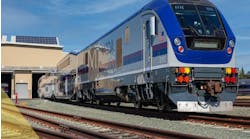Denver RTD extends contract with Masabi, launches TSP project with INIT/Mattersoft
The Denver Regional Transportation District (RTD) has signed onto two separate contracts with Masabi and Mattersoft, a member of the INIT group. The work will expand accessibility and efficiency through Denver RTD's system.
Masabi
Denver RTD extended its contract with Masabi, continuing its access to the Fare Payments-as-a-Service platform, Justride. The account-based ticketing solution offers customers the option to tap MyRide smart cards or scan the MyRide app when boarding buses or at a rail station instead of purchasing passes upfront.
Under the terms of the extended agreement, Masabi will continue to provide Denver RTD with its end-to-end fare payment platform, which includes mobile ticketing solutions and fare payment validation to streamline the transit experience for customers and operations for Denver RTD.
Where Denver RTD initially deployed a mobile-only solution using the Justride platform, the solution now extends to supporting the full purchase and payment system to include other customer groups and fare media in a seamless and secure system.
Mattersoft
Mattersoft has successfully deployed its first live Traffic Signal Priority (LIVEtsp) project in the United States in partnership with Denver RTD. The pilot works to empower smart traffic control to bring improved schedule adherence and better on-time vehicle performance.
LIVEtsp has been configured at 22 of Denver RTD’s key intersections throughout the system area. The program supports up to 400 vehicles online simultaneously and manages approximately 3,000 TSP requests daily. Real-time vehicle data, including GPS positions, is received from on-board computers via mobile networks. Denver RTD notes that due to its centralized nature, the system requires no additional vehicle hardware and only a small modem and basic relay in each traffic control cabinet.
"[Denver] RTD is excited about the new conditional TSP feature," said Denver RTD Senior Project Manager, IT, Eric Farrington. "It lets our buses skip priority requests when they're ahead of schedule or empty, making our service smarter and more efficient."
Priority requests are processed on the server based on incoming vehicle data and transmitted to the city’s traffic signal controllers through a seamless cellular connection from the LIVEtsp backend. The web-based user interface provides a real-time map, showing vehicle positions once per second for real-time accuracy and offers comprehensive performance reports with valuable insights into system performance and optimization opportunities.
LIVEtsp at Denver RTD adjusts traffic signals in real-time allowing them to spend less time at red lights, resulting in shorter travel times and more efficient routes.

Eman Abu-Khaled | Associate Editor
Eman Abu-Khaled is a graduate of Kent State University with a bachelors in journalism. She works through Endeavor Business Media with Mass Transit as an associate editor. Abu-Khaled brings a fresh perspective to the visual side of journalism with an interest in video and photography work.







